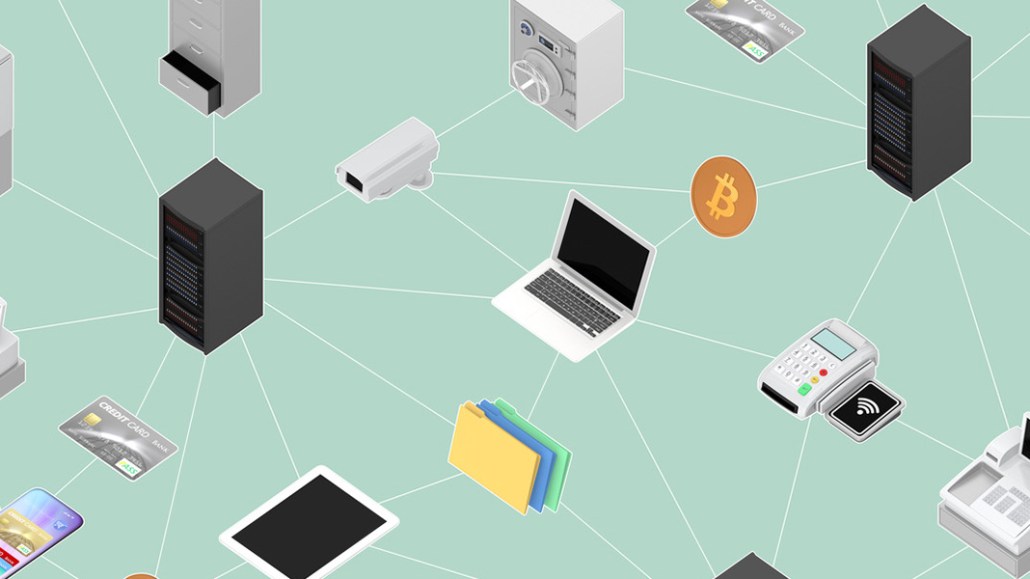Secure your place at the Digiday Publishing Summit in Vail, March 23-25
Brands are using blockchain to promote sustainable products

Subscribe to the Digiday Retail Briefing: A weekly email with news, analysis and research covering the modernization of retail and e-commerce.
Customers are willing to pay more for sustainable products — and brands are betting on blockchain to make that happen.
The technology, best known for underpinning bitcoin, is being used by brands to develop a shared electronic record that tracks a product’s origins from farms, factories and across transportation routes to the store.
Recent examples cut across product categories, including food, apparel and jewelry. Walmart has been using the technology to track food items’ trajectories, following successful trials with pork in China and sliced mangoes in the U.S. two years ago. In May, diamond company De Beers rolled out a blockchain tool called Tracr to track the paths of diamonds from mines to cutters to polishers to confirm they’re not being used to support violence. In the fashion world, designer Martine Jarlgaard last year began a pilot program with startup Provenance using a digital platform to track the path of raw garments to consumers’ shelves. Companies using the technology have promoted these efforts through media outreach over the past year; Walmart said it will eventually introduce ways for customers to interact with its blockchain solution.
Brands say blockchain can be used to meet consumer demands for sustainability and safety. Sustainability has an important marketing side effect — through a transparent history of product transactions, companies can more effectively tell brand stories and build consumer confidence. Through a shared ledger where all transactions are visible, brands can reassure customers that products are safe and sourced legally and ethically.
“We are headed into an era where there will be waning trust in online marketplaces because it is increasingly difficult to verify the quality of the products or sellers,” said Forrester retail analyst Sucharita Kodali. “Quality product and sellers will be a parameter of differentiation.”
Walmart currently uses blockchain to track 25 types of food products, including a selection of berries, chicken and milk, according to Frank Yiannas, Walmart’s vp of food safety and health. While he said food safety is a non-competitive issue (Walmart uses an IBM blockchain platform along with handful of other retailers, including Kroger, Driscoll’s and Unilever), he acknowledged that building consumer trust is an important consequence of these efforts.
“Customer expectations are changing — they want to know more about where their food comes from, how it was grown, if it’s organic; we strive to be the most trusted retailer,” he said, in an interview at the Bloomberg Value of Data conference in New York this week.
Marie Wieck, gm of IBM Blockchain, said blockchain has potential for retailers who are looking to prove product origins to customers, adding credibility to sustainability claims.
“We’re seeing use cases that get at the sourcing decisions, like ‘I want to support sustainable farmers,’ or ‘I want to support local retailers,'” she said. Retailers and CPG companies are using blockchain for good as part of their own corporate social responsibility efforts, including, for example, fair-trade certification, she added.
In addition to its blockchain-based food tracking platform that Walmart uses, last month, IBM and Maersk rolled out a blockchain-based shipping solution called Trade Lens — a shared digital repository of transactions. Ninety manufacturers and retailers globally are currently on board, according to IBM, but it wouldn’t say which ones.
Despite blockchain’s promise as a tool to build credibility among consumers, the technology is still in its infancy, with brands and providers still trying to address data-quality issues, including building technology to detect when errors are introduced. Others question whether use of blockchain product tracking itself will result in a brand lift, arguing it’s one component of a larger strategy to build consumer confidence.
“I’m not sure that blockchain is directly tied to brand equity,” said Kodali. “It could be an enabler.”
Implementation is also concern, particularly challenges involved in embedding tracking devices in physical goods at scale.
“When you start to take [tracking] and put it into the physical world across a very complex and multinational supply chain, things get complicated, like how are you going to embed a chip into a luxury bag and how do you verify that the chip is safe?” said Josh Ong, director of global brand strategy at the Blockchain Wave Lab, Cheetah Mobile’s blockchain product studio.
More in Marketing

‘The conversation has shifted’: The CFO moved upstream. Now agencies have to as well
One interesting side effect of marketing coming under greater scrutiny in the boardroom: CFOs are working more closely with agencies than ever before.

Why one brand reimbursed $10,000 to customers who paid its ‘Trump Tariff Surcharge’ last year
Sexual wellness company Dame is one of the first brands to proactively return money tied to President Donald Trump’s now-invalidated tariffs.

WTF is Meta’s Manus tool?
Meta added a new agentic AI tool to its Ads Manager in February. Buyers have been cautiously probing its potential use cases.








